Is the beauty of Mount Everest exclusive to the ambitious climbers? Of course not. Normal travelers are able to glaze at its spectacular north face in Tibet as well.
This 8 days private tour, also our best-selling tour, is strongly recommended for everyone with an Everest dream. Don’t worry too much about high altitude sickness, because you can acclimate yourself with altitude gradually from 3,650m to 5,100m. Starting from Holy City Lhasa, you will be provided with almost all Tibet’s cultural essence here before turning to your final destination. Besides, more landscape awaits your discovery en route, like sacred Yamdrok Lake, magnificent Karola glacier, sky-touching snow peaks, featured monasteries, colorful prayer flags as well as photographic winding roads, which all bring you great enjoyment in your once-in-a-lifetime adventure.
All-inclusive tour package with competitive price, covering all Tibet permits, private tour guide, driver, accommodation, meals, pickup and drop off.
Highlights of this tour:
- Get amazed by the magnificent appearance of Potala Palace from different perspectives before walking into the palace to explore the treasurable collections;
- Be immersed in the devoted atmosphere of murmuring pilgrims in Tibet’s most significant Buddhist monasteries, like Jokhang, Drepung, Sera Monastery, etc.;
- Enjoy countless “WOW” moments during the scenic driving experience from Lhasa to Mount Everest via Yamdrok Lake, Gyantse and Shigatse;
- Reach Rongbuk Monastery to savor the unparalleled magnificence of Mount Everest and praise yourself with the most breathtaking sunrise and sunset if the weather permits.
Tour Brief Information
- Tour price: from $1,599
- Tour code: TD-EBC-08
- Tour Type: Private Customizable Tour Package
- Destination: Lhasa / Gyantse / Shigatse / Everest / Lhasa
- Duration: 8 days and 7 nights
- Departure: Flexible
- Travel Theme:





- Best Time:


- Physical Level
- Tour Pace
Tight
- Max Altitude
5,200m
- Itinerary Details
- Included Services & Fees
- Reviews
- Gallery
- Make an Enquiry
Itinerary Details - Day by Day
Day 1 Lhasa Arrival
Lhasa Airport / Train Station Pick UpWelcome to the roof of the world! You will be picked up by local tour guide at Lhasa airport hall or train station, and then be escorted to check in your hotel in Lhasa city (3,650 m) in a private vehicle. The rest of the day is free for you to explore the local areas and acclimatize yourself to the air, temperature and high altitude of Lhasa.
High Altitude Acclimation Tips: 1) go for some leisure walking to acclimate the high altitude but avoid strenuous activity after arrival; 2) you'd better not have bath, in case of catching a cold; 3) drink more water, and have some fruit; 4) have a good rest...
How to Get to Lhasa: take a domestic flight from other cities like Chengdu, Beijing, Xian, Xining, Kunming, etc. or an international flight from Kathmandu, or take a train from China's other cities, like Chengdu, Xian, Beijing, Chongqing, Shanghai, Guangzhou, Xining, Lanzhou, etc.
-
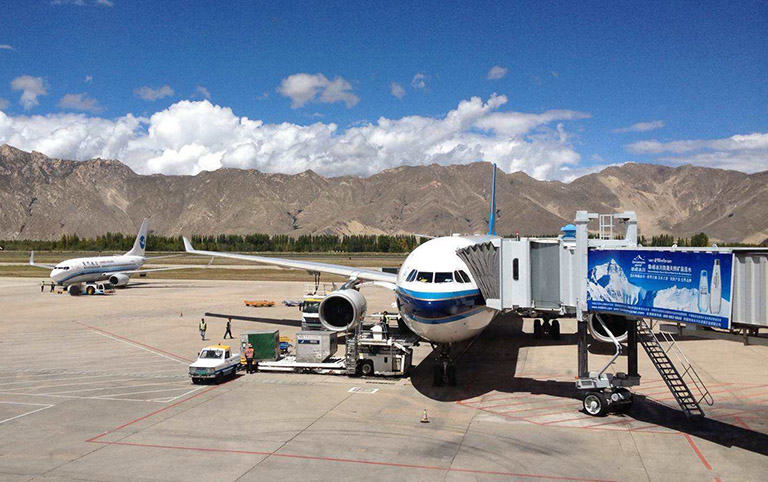 Lhasa Gonggar International Airport
Lhasa Gonggar International Airport
Day 2 Lhasa (B)
Today's Highlights: Norbulingka, Drepung Monastery, Sera MonasteryToday you will visit popular attractions in Lhasa city and suburb to explore Tibetan culture. You will firstly go to visit the beautiful Norbulingka which used to be the former summer palace of Dalai Lamas in the ancient time, and now is a public park. Dotted with various kinds of precious flowers and plants, it is the genuine "Plateau Oxygen Bar". In addition to its magnificent buildings and colorful flowers, Norbulingka also features some big Tibet event activities during big festivals, like Tibetan shows in annual Shoton Festival. Next, drive several kilometers to the western outskirts of Lhasa to visit Drepung Monastery. Drepung, in Tibetan, means "prosperity". Since its establishment, Drepung Monastery has always been one of the most important Buddhist monasteries in Tibet. In its heyday, there were more than 10,000 monks lived and studied in the monastery. Throughout its history, many important and famous Tibetan leaders used to study here, especially the Dalai Lamas. So Drepung Monastery is also respectfully known as the "Mother School of Dalai Lamas". You can also enjoy a panoramic view of Lhasa from Drepung Monastery.
In the afternoon, you will be taken to another famous monastery in Lhasa - Sera Monastery. It is famous for the spectacular "Buddhism Debating". As a daily routine, the monks gather in a courtyard, and debate on the Buddhist doctrines with supplemented gestures, which is thought to be helpful to facilitates better comprehension of the Buddhist philosophy to attain higher levels of study. After enjoying the "Buddhism Debating", you will be transferred back to the city. The rest time is your own free time to rest.
The Etiquette of Visiting Monastery: 1) you shouldn't wear short and uncover shoulders; 2) taking off your sunglasses and hat before entering the chapels; 3) taking photos is usually not allowed inside the chapels.
-
 Chona from Philippines saw Buddhsit scripture debating in Sera Monastery
Chona from Philippines saw Buddhsit scripture debating in Sera Monastery
-
 Drepung Monastery Roof
Drepung Monastery Roof
-
 Enjoy the bright flowers in Norblingka
Enjoy the bright flowers in Norblingka
Day 3 Lhasa (B)
Today's Highlights: Potala Palace, Jokhang Temple, Barkhor StreetStart today's Lhasa exploration with an exciting visit to the landmark - Potala Palace which is the home to the successive Dalai Lama as well as a great masterpiece of Tibetan architecture. The whole palace is divided into the White Palace - living quarters and office to deal with political and Buddhist affairs for Dalai Lamas, and the Red Palace where houses several stupas of previous Dalai Lamas, many historical relics and precious arts. After entering the gate of Potala Palace, you need to walk up about 30 minutes along the zigzag stone paths with white-and-red walls to the White Palace. Remember to ascend the steps slowly and take some stops for sightseeing and rest which will be helpful to reduce high altitude sickness. Then explore the palace in an orderly way from the White Palace to the Red Palace, and exit from the back side. After Potala Palace visit, go to enjoy a leisure stroll in Zongjiao Lukang Park, a lovely park with pleasant scenery built around the lake behind Potala Palace. It is a great place to experience local Tibetans' living styles as you can see local people gathering and chatting, taking exercise, walking the kora, feeding wild birds and ducks, etc. If your day is clear, you can take some great photos of the reflection of Potala Palace on the lake in the park.
Continuing your exploration, you will then get to Jokhang Temple which is considered as the spiritual center of Lhasa and the most revered religious structure of Tibet. In front of Jokhang Temple, you can see crowds of pilgrims polishing the flagstones with their prostration, which is truly a heart-touching scene you will ever see. This temple is also known as the "house of Buddha" because it keeps the precious Jowo Rinpoche, the life-sized (5 foot/1.5m) image of the Shakyamuni at the age of 12. Rise to the top floor of this temple, you can see savor the beautiful golden roof and the view of Potala Palace afar. The last site for today’s exploration is the famous Barkhor Street. It is a circular and wide street encircling the Jokhang Temple. The local people like to walk on the street for several circles usually in the late afternoon as a daily tradition of pilgrimage. The street also has many shops selling a wide variety of traditional Tibetan goods, religious items and handcrafts.
Optional Activity: If your physical strength permits, take a short climb to the viewing-deck of Chakpori Hill to take a panoramic photo of Potala Palace after your Potala Palace visit.
Tips of today: 1) taking photos is not allowed inside the palace; 2) today you will be mainly outside, please bring some water, a hat, sun cream, and sun glasses with you.
-
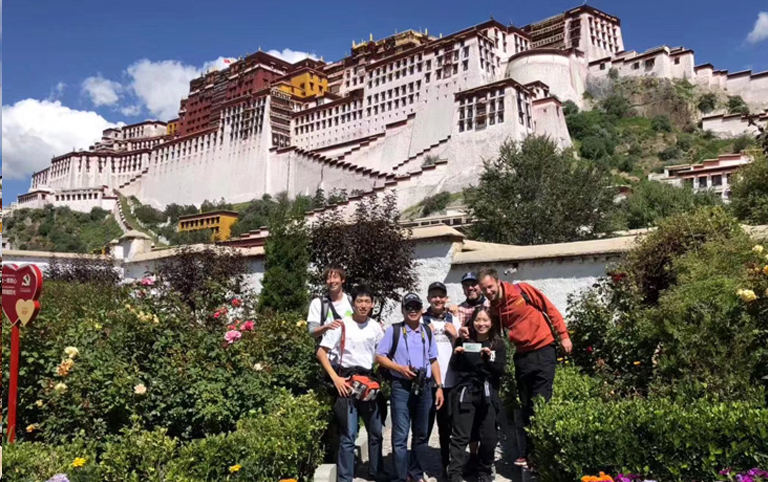 Armin's Group from Germany visited Potala Palace
Armin's Group from Germany visited Potala Palace
-
 Jokhang Temple Square
Jokhang Temple Square
-
 Souvenirs Sold on Barkhor Street
Souvenirs Sold on Barkhor Street
Day 4 Lhasa - Shigatse / 360km, About 8hrs' Driving (B)
Today's Highlights: Yamdrok Lake, Karola Glacier, Palcho MonasteryToday, you will leave Lhasa and drive about 8 hours to Shigatse, the second largest city in Tibet. It may be a long journey, but there are many things to do along the road. You will first take a short stop in the viewing platform of Yajiang River Valley (4,280m) where you can take a view of the snaking road and gorge scenery. Go on with your trip and you will reach your first highlight - holy Yamdrok Lake (altitude: 4,400m). As the largest fresh lake in the northern of the Himalaya Mountains, it spreads about 675 square meters from south to north, like an eardrop lying in the arms of snow-capped giant mountains. Viewing from a distance, you can see fertile pastures full of yaks and sheep, and some small Tibetan villages along the lakeshore. Keeping driving not so far from Yamdrok Lake, you will get to the imposing Karola Glacier (altitude: 5,045m) towering aloft on the right side of the road. Go on driving, you will pass by Simi La Pass (4,353m). Have several minutes' break here to take some photos of Simila Mountain and Manla Reservoir.
Continuing your trip, you will get to the historical city of Gyantse. Feel hungry? Have a good lunch in the town, then go to visit the mysterious Palcho Monastery (altitude: 4,040m). The monks and tradition of three important sects of Tibetan Buddhism - Sakyapa, Zhalupa and Gelukpa, peacefully coexist in this monastery. Its Kumbum, which is 35 meters high and has 76 small chapels with hundreds images of Kriyatantras, is believed to be the largest such structure in Tibet.
After the Gyantse sightseeing, keep drive about 3 hours, you will arrive at your hotel in Shigatse (altitude: 3,800m). Have a good rest!
Tips of today: 1) wear warm clothes to prevent from cold and wild; 2) pack some food and drinks with you because you will spend much time on the road.
-
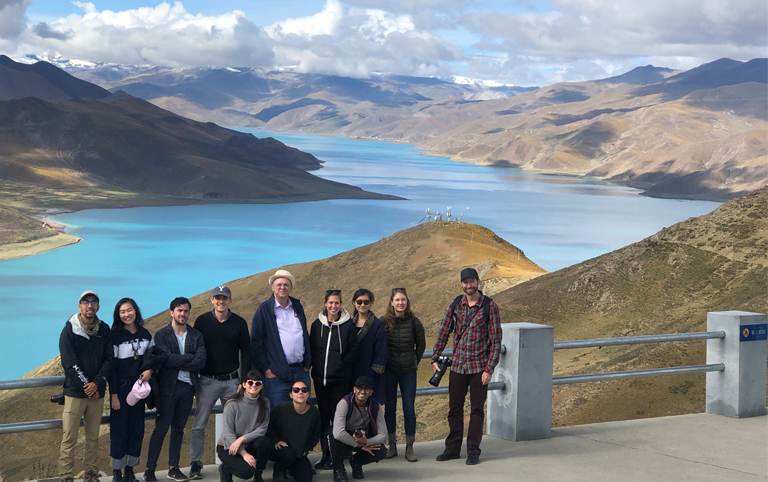 Our customers from Yale University visited Yamdrok Lake
Our customers from Yale University visited Yamdrok Lake
-
 White Pagoda of Palcho Monastery
White Pagoda of Palcho Monastery
-
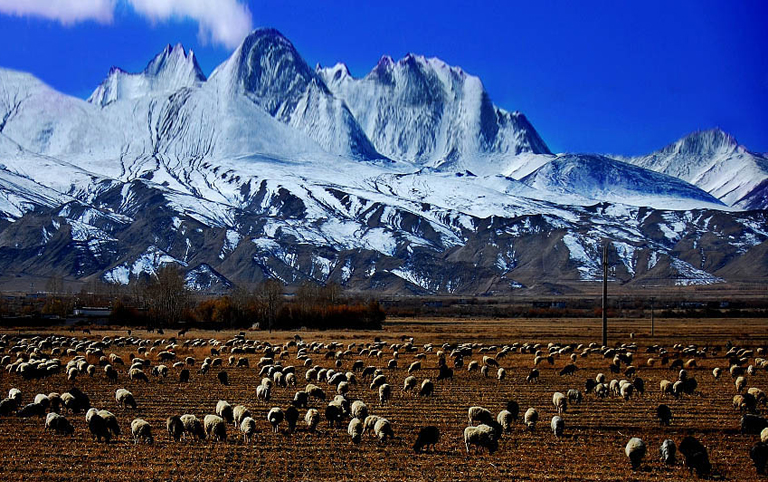 Black rocks of Karola Glaceier are contrasting starkly with the surrounding snow-capped peaks
Black rocks of Karola Glaceier are contrasting starkly with the surrounding snow-capped peaks
Day 5 Shigatse - Mount Everest / 350km, About 7hrs' Driving (B)
Today's Highlights: Himalaya Views from Gawula Pass, Mount EverestToday, you will leave Shigatse for the final destination of your Tibet trip - Mount Everest. Though being a long driving of about 7 hours, but the views along the road are stupendous. As you reach Gawula Pass (5,250), you’ll feast your eyes on the fantastic view of Himalaya range including several famous peaks over 8,000 meters, including Mt. Makalu (8,463 m), Mt. Lhotse (8,516 m), Mt Everest (8,844 m), Mt. Cho Oyu (8,201 m) and Mt. Shishapama (8,020 m). When you finally get to the Rongbuk Monastery, and get the first sight of the mighty Everest, you will immerse in a solemn ethereal mood and find all the efforts you have made along the long way are not in vain. Located about 5100 meters above the sea level, Rongbuk Monastery is the highest monastery in the world. It is the best location to take some great photos of the front face of Mount Everest. The rest of today is free for you to visit the Rongbuk Monastery and explore the nearby Everest Base Camp. Take photos with the Everest altitude marker and EBC marker to commemorate your wonderful adventure tour.
Accommodation: if you visit Mount Everest during the off season (November to April), you will accommodate at Rongbuk Guest House near the Rongbuk Monastery; if you visit Mount Everest during the peak season (May to October), you will accommodate in a local Tibetan tent at Everest Base Camp which is only run between May and October by local Tibetans. It is near Rongbuk Monastery as well. Please note that the accommodation at both places is very simple and basic, only dorm beds with communal squat toilets are available. Duvets, heated blankets and hot water will be provided, and you are suggested to bring your own sleeping bag and toilet paper. There is no running water, sinks or showers. The dining room just offers basic breakfast and dinner without menu. Remember to dress warmly all the time.
Tips of today: bring a warm coat for low temperature in Everest and avoid strenuous activity to prevent from high altitude sickness.
-
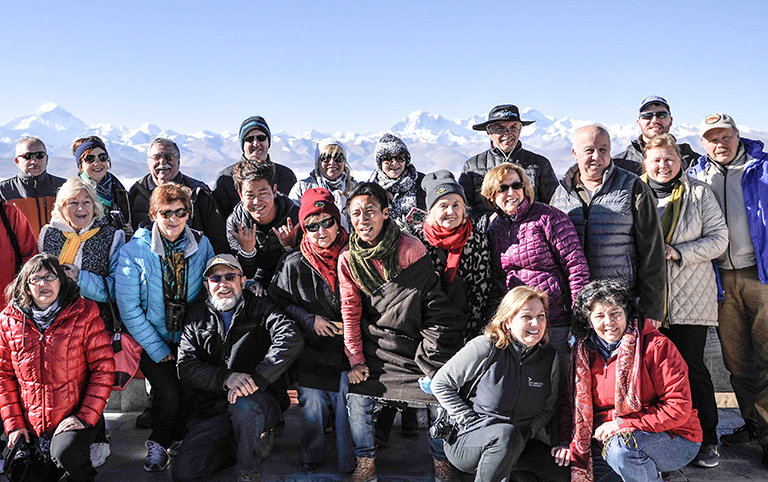 Boguisia's group had a good view in Gawula Pass
Boguisia's group had a good view in Gawula Pass
-
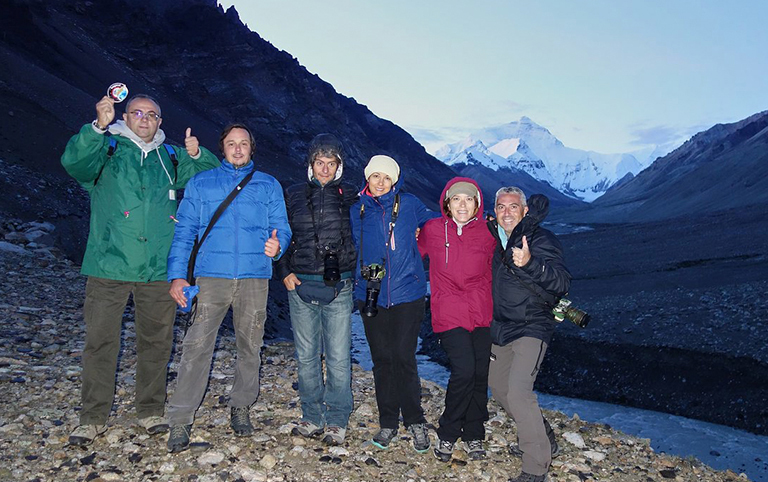 Alfonso's group from Italy visited Rongbuk Monastery to shoot Everest
Alfonso's group from Italy visited Rongbuk Monastery to shoot Everest
-
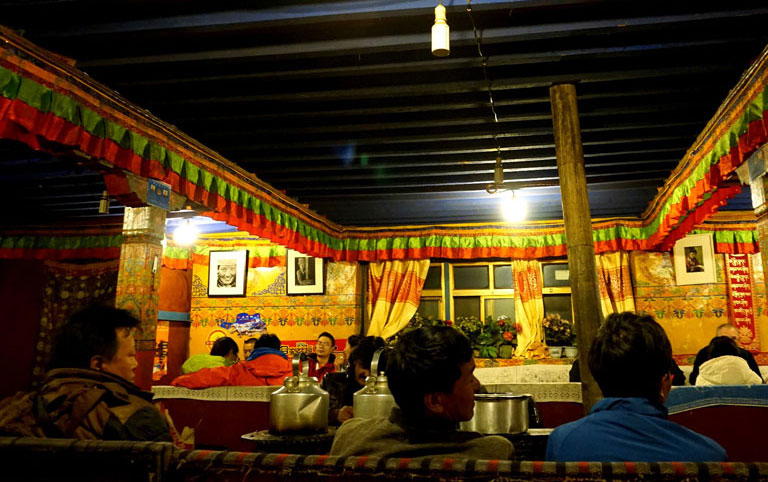 Dining Room in Rongbuk Monastery Guesthouse
Dining Room in Rongbuk Monastery Guesthouse
Day 6 Mount Everest - Shigatse / 350km, About 7hrs' Driving
Today's Highlights: Sunrise over Mount EverestWake up early to enjoy the marvelous sunrise on the peak of the world from Rongbuk Monastery. The top part of the Mount Everest is always covered with snow all the year round, and when the sun shines on the mountain, the peak is like a giant white pyramid, which is one of the most famous sceneries of Mount Everest. In bright days, you can also see a wisp of cloud hanging above the top of Mount Everest. It flies eastward in the fast western wind just like a flapping flag. This unique phenomenon is the spectacular “Cloud Flag”. The cloud will change from surging waves into a thin cooking smoke or from galloping steeds into the mysterious veil of a goddess.
Till now your Mount Everest adventure is about to end. The rest of today is to drive back to Shigatse City. Have a good rest in Shigatse City.
Tips of today: 1) the sunrise usually starts around 6:30 am to 7am on Mount Everest; 2) keep warm all the time.
-
 Wonderful View of Mount Everest
Wonderful View of Mount Everest
-
 Mount Everest Flag Clouds
Mount Everest Flag Clouds
Day 7 Shigatse - Lhasa / 280km, About 6hrs' Driving (B)
Today's Highlights: Tashilhunpo Monastery, Nyemo TunbaToday after breakfast, you will firstly take a visit to the official seat of Panchen Lama - Tashilhunpo Monastery which is also the largest and most influential Gelug Monastery in Shigatse prefecture. Here you will see a giant statue of Future Buddha, the largest one of its kind on earth (26.2 meters high and 11.5 meters wide), decorated with precious pearls, turquoises, corals and ambers.
Then drive back to Lhasa long the legendary Yaluzangbu River, the mother river of Tibet. On the halfway, you will take a visit to Nyemo Tunba which was the home of Tunmi Sangbuzha who invented the Tibetan character as well as the famous Tibetan Incense. In the peak season (May ~ October usually), you also have a chance to witness the process of making Tibetan Incense with water mill. At the same time, the scenery here is fabulous - ancient cypress trees, green willows, murmuring river...
Take a good rest in Lhasa.
-
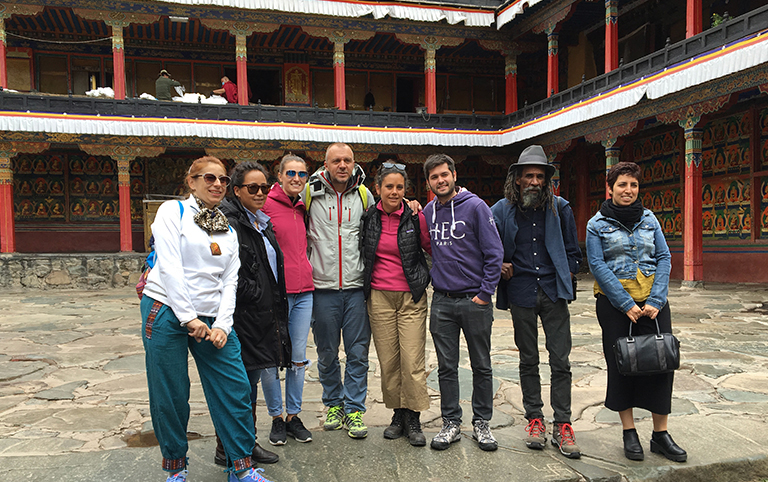 Silvia's group in Tahilhunpo Monastery
Silvia's group in Tahilhunpo Monastery
-
 Glorious architecture of Tashilhunpo Monastery
Glorious architecture of Tashilhunpo Monastery
-
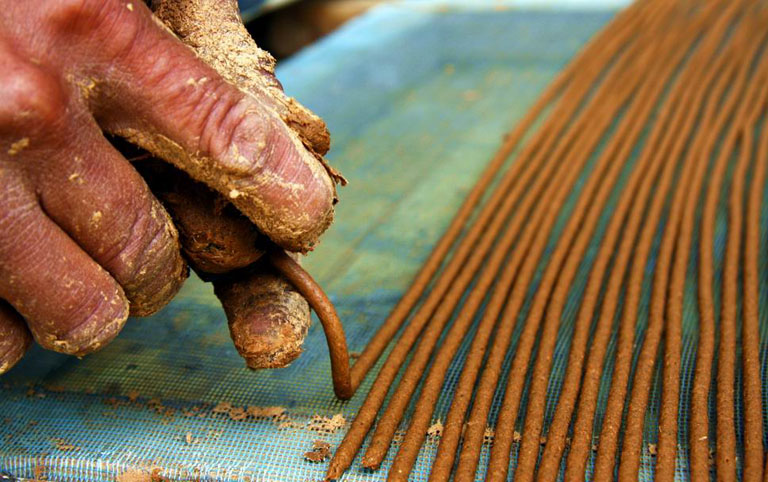 A worker is making Tibetan Incense
A worker is making Tibetan Incense
Day 8 Lhasa Departure (B)
You will be escorted to Lhasa Gonggar Airport or Lhasa Train Station for departureToday is free for you until your tour guide transfer you to the airport in time for your flight or drop you off at Lhasa train station.
Tips of today: 1) please pack your luggage carefully, especially for small things like camera charger, power adaptor, mobile phone, phone charger, wallet and towel; 2) if your flight is arranged in the afternoon, please make sure you check out the hotel before 12pm.
Useful Trip Notes
-
- 1. Tibet Permits Guaranteed
To travel in Tibet, all Non-Chinese passport holders need to have a Tibet Travel Permit which is issued by Tibet Tourism Bureau in Lhasa. And only Chinese travel agencies like Tibet Discovery can apply for the permit on behalf of tourists. You must obtain it before your tour starting because the permit will be checked when you board your flight/train to Tibet. Traveling with Tibet Discovery, you don't have to worry about the complicated procedures of Tibet Travel Permit application. All you have to do is to confirm a tour package with us and send us your passport and Chinese visa copies at least 15~20 days in advance before your tour, then we will take care of all the rest things. Once the permit is issued, we will deliver to your address in China, such as your hotel, local travel agency, etc.
-
- 2. Available Months to Visit Tibet
Generally speaking, April to October is the best time. July and August are the peak season and rainy season. It is usually snowy and cold in winter, which is not suitable for visit Mount Everest, Namtso and Mount Kailash regions. While other places such as Lhasa, Gyantse and Shigatse are suitable for travel all year around. The temperatures in daytime and night differs a lot, usually 5~15℃ in the daytime and -5~0℃ in the night, so please wear accordingly.
-
- 3. High Altitude Sickness
The average altitude of Tibet is about 4000 meters above the sea level (Lhasa: 3700m; EBC: 5200m; Namtso: 4718m). You may suffer a bit from High Altitude Sickness in the beginning days of your Tibet trip if you haven’t had rich high plateau travel experience. But don’t worry too much, the high altitude can be acclimatized usually in 2~3 days. Our suggestion is to take a physical examination and get suggestions from your doctor, and also bring some medicines to prevent from High Altitude Sickness before your trip. While in Tibet, you should keep warm all the time, avoid strenuous activities, drink more water and eat more vegetables and carbohydrates. You’d better not take showers during the first two days after your arrival in Tibet. If you don’t feel well, get help from your tour guide or go to the hospital without any delay.
-
- 4. How to Go to Tibet
Basically you have two options – flight and train. Currently, you can take a flight to Lhasa from Beijing(4.5hrs), Xian(3.7hrs), Chengdu(2.5hrs), Chongqing(3hrs), Kunming(3hrs), Kathmandu (1.5hrs), etc. Among all these cities, Chengdu and Xian have more frequent flights to Lhasa.
If you prefer a train travel, you can take a train to Tibet from Beijing(40.5hrs), Xian(32hrs), Chengdu(43hrs), Shanghai(47hrs), Chongqing(42hrs), Lanzhou(25hrs), Xining(22hrs), Guangzhou(54hrs). -
- 5. Packing and Wearing Ideas
Firstly you can’t forget your passport and Chinese Visa. A large backpack and a smaller one are recommended (the smaller one can be used for daily activities). Also bring necessary medicine you need. Other stuffs like sunglasses, snow glasses, hats, lip balm, sun block are recommended.
As for wearing, you are suggested to dress in layers (both thin and thick jackets). Down jacket is necessary in Spring and Autumn. A pair of durable and comfortable shoes is necessary.
Recommended Tibet Group Tour Packages
Escorted by a skilled driver and companied by a professional local tour guide to organize all the activities, all you have to do is to enjoy your fantastic Tibet journey.Following are some other recommended Tibet group tour packages that you may be interested in. You can also contact us to customize a trip if you want..
-

Lhasa / Gyantse / Shigatse / Mount Everest / Gyirong
7 Days Lhasa to Gyirong Border Overland Tour via Mount Everest
Highlights: Potala Palace, Yamdrok Lake, Palcho Monastery, Mount Everest
-

Lhasa / Shigatse / Mount Everest / Namtso Lake / Lhasa
9 Days Tibet Discovery Tour plus Everest and Namtso Expedition
Highlights: Potala Palace, Yamdrok Lake, Mt. Everest, Namtso Lake
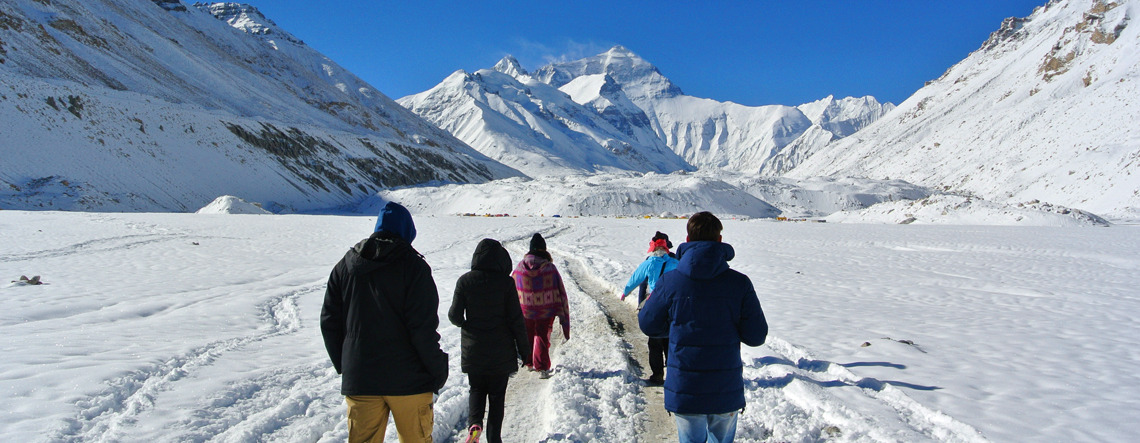
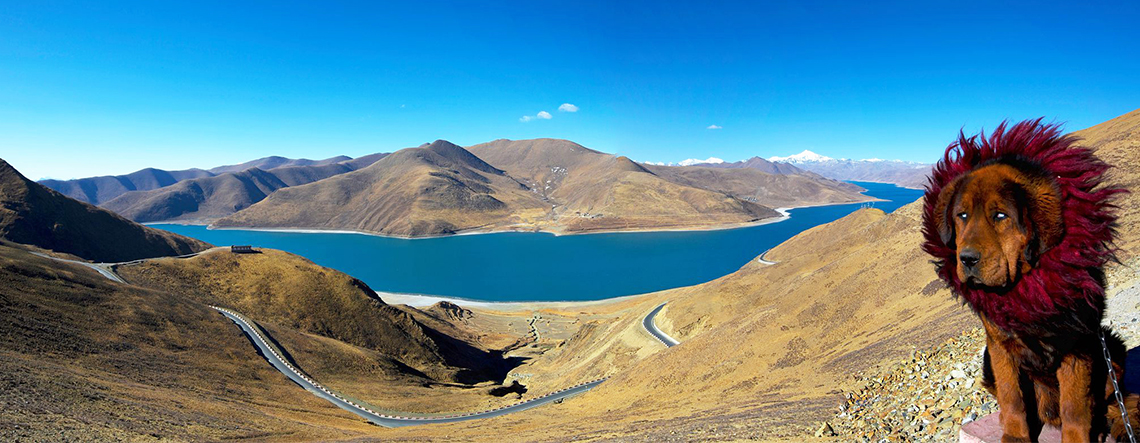
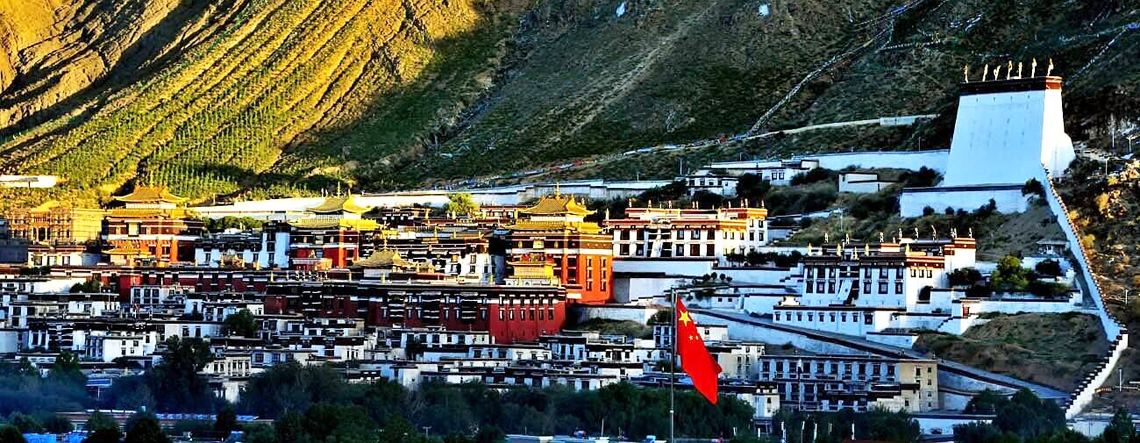

 Karen
Karen Wonder
Wonder Jack
Jack Rita
Rita Johnson
Johnson Vivien
Vivien Wing
Wing Ariel
Ariel Leo
Leo Tracy
Tracy Evelyn
Evelyn April
April Phoebe
Phoebe Kelly
Kelly Shirley
Shirley Reya
Reya Juliet
Juliet Elk
Elk Karina
Karina Tammy
Tammy Felix
Felix Sean
Sean